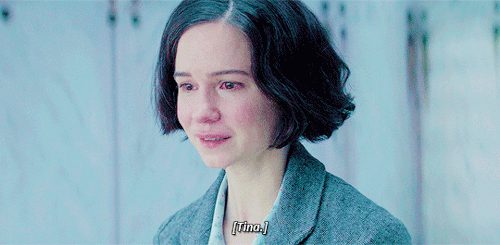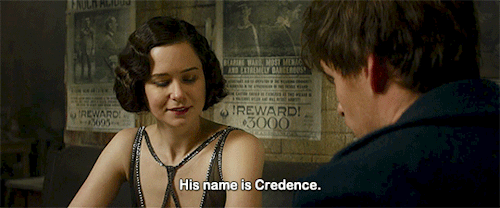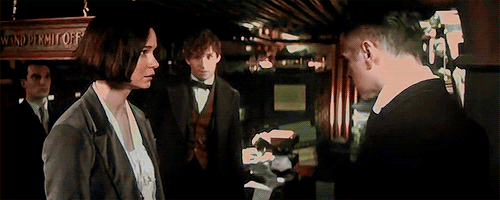What Does Newt Scamander Understand About Tina Goldstein That Fans Don’t Get?
Tina Goldstein comes off as bland at best and downright unpleasant at worst, especially when stood next to ever-charming and effervescent Queenie, warm and comical Jacob, or sweet and endearing Newt. That is the sentiment I hear most often when I try to engage fellow Potter fans on the subject of Tina Goldstein. I don’t agree with a single word of it.
First of all, how anyone could come out of Fantastic Beasts and Where to Find Them with the impression that Tina is cold and unfeeling is beyond me.
Secondly, if you feel compelled to dislike Tina because she’s “bossy” or “standoffish” or “unpleasant” or “not as likable as Queenie,” maybe take a moment to think about why those things specifically put you off to her. As one of my MuggleNet colleagues pointed out, when we judge female characters in this way, we’re most often judging them for not being conventionally feminine enough. But we manage to love and appreciate many characters despite their distinct lack of perfect makeup, pretty dresses, and a bubbly personality. We should make an effort to do the same for Tina. Newt Scamander – for all his social awkwardness – is a scarily good judge of character. If Newt Scamander thinks the world of Tina Goldstein, then we know she has something valuable to offer.
The first thing Newt learns about Tina is that she’s desperate to get her job back. That’s evident in how quickly she apprehends him and how disappointed she is when Madam Picquery dismisses her. But Newt can see that Tina didn’t just arrest him for selfish reasons. His actions at the bank risked the exposure of the wizarding world. Though it isn’t officially her job anymore, Tina still feels she has a duty to protect people from harm and to enforce the law. Even though she hinders his search for his escaped creatures, Newt understands and respects her motivations.
Some people hate Tina because she endangered Newt and his creatures in her desperation to get her job back. But Tina’s reaction to Newt escaping her home in the middle of the night was a reasonable one. Tina doesn’t know that several beasts besides his Niffler and the Murtlap had escaped the case. She trusts Newt to stay put for the night and offers to help find his Niffler in the morning. Newt breaks her trust by escaping, and when Tina sees him wrangling an enormous and dangerous-looking Erumpent back into his case, she decides she must bring him in before he causes any more destruction.
She must have been expecting that he’d be calmly interrogated and given a proper chance to explain himself, but thanks to Graves, things go very differently. The horror on Tina’s face when they’re arrested, interrogated, and nearly executed clearly shows that she did not mean for any of this to happen. It’s certainly evident to Newt, who doesn’t harbor a trace of resentment toward her. When Graves pulls out the Obscurus during their interrogation, Newt turns to Tina – the person responsible for this whole mess in the first place – and implores her to trust him. He needs her to know that he, too, is only interested in protecting the vulnerable from harm.
Tina’s adventure with Newt revealed to her all the ways in which the system she put her faith in has failed not only her but also the people it is supposed to protect. MACUSA fired her for protecting Credence from his abusive mother, arrested Newt without listening to his explanation, and later destroyed Credence just as Tina was managing to calm him down. Unlike the rest of MACUSA, Tina never saw Credence as a threat to be exterminated but as a human being first and foremost. When Tina is reinstated as an Auror, she goes back to MACUSA with a renewed conviction to use her power and authority to do the right thing, even from within an unjust system. In Fantastic Beasts: The Crimes of Grindelwald, she defies MACUSA again, determined to protect Credence from both Grindelwald and people like Travers.
Tina Goldstein has a strong moral compass and an abundance of compassion. Newt and Tina share a strong sense of justice and devote their lives to protecting the vulnerable. Tina became an Auror for exactly those reasons, which are the only reasons anyone should ever become an Auror for in Newt’s view. Tina eventually comes to understand the value of Newt’s work just as Newt comes to understand that Tina isn’t a typical Auror. They are both visionaries, “middle heads” if you will, who take seriously work that the rest of society would deem unimportant. More than anything, Tina Goldstein is just a genuinely good person in a world where genuinely good people are few and far between. That alone makes her plenty interesting to me.
What do you think of Tina Goldstein? You’re allowed not to like her, but just know I’ll be judging you very harshly for saying so.












